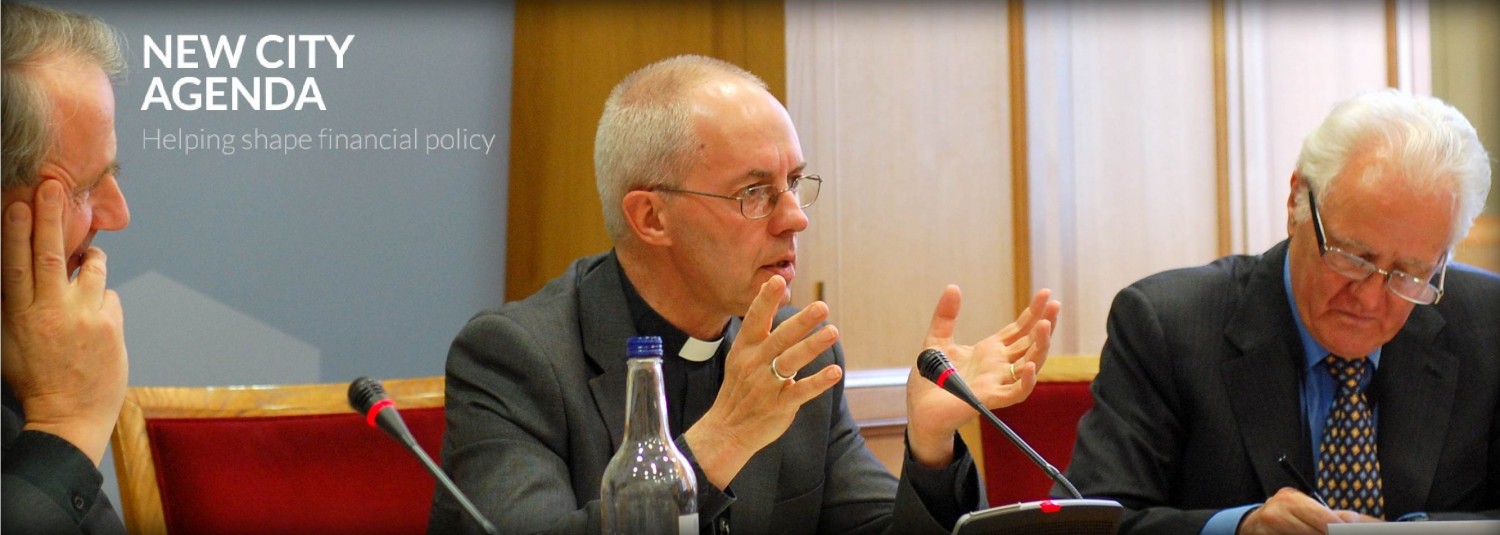Many thanks to The Most Reverend and Right Honourable Justin Welby, Archbishop of Canterbury for addressing the New City Agenda audience on the 17th June 2014, on the topic of Banking Standards and Ethics.
Fresh from his meeting with Pope Francis in Rome, we were delighted to welcome Justin Welby, the Archbishop of Canterbury to provide the second in our series of lectures.
The Archbishop gave us a wide ranging and enthralling insight into the time he sat on the Parliamentary Commission of Banking Standards and where he believes shortcomings still exist in the Banking Industry.
He began by reminding us of the sheer scale of work undertaken by the Banking Standards Commission, which had been set up for six months but lasted for two years, producing five Reports.
The first Report began by undertaking the pre-legislative scrutiny for the Financial Services (Banking Reform) Bill.
The second, Banking reform: towards the right structure considered the Government’s response to the first report and proposed amendments to improve the Bill in a number of key areas. The vast majority of those amendments were incorporated in the Bill.
The third and fourth reports focussed on specific examples of the banking system, namely ‘Proprietary Trading’ and its impact on the culture and standards in banks and ‘An accident waiting to happen’: the failure of HBOS’ which, in his view, failed not because of casino banking but because of bad banking.
The Commission’s final report ‘Changing banking for good’ outlined the radical reform required to improve standards across the banking industry and presented government, the regulators and industry with a package of recommendations which, taken together, were intended to raise standards and drive positive cultural change.
The vast majority of the legislative recommendations were adopted.
The Archbishop also noted that Payday lending has declined significantly since the Commission looked at it but expressed concern that if payday lending declines rapidly and credit unions do not take up the slack, people will have nowhere to turn except loan sharks. There is a danger of a gap in the market because it will take ten years for credit unions to become an effective provider of low cost funds even though they have shown enormous growth in the last 12 to 18 months.
Another development, since the report, has been a growing focus on shadow banking, which was alluded to in Banking Standards Commission reports. He agreed with a recent article in the Financial Times by The Governor of the Bank of England, citing the need for fire breaks between shadow banking and the main commercial banking industry. Shadow banking, by its very nature, is an area of significant potential risk and firebreaks need to be in place. He also highlighted the problem of the cross-contamination of cultures between investment banking and commercial banking which the Parliamentary Commission on Banking Standards specifically examined. Commercial banks ran into the most serious trouble and caused fear and disruption in the markets.
He mentioned challenges in the regulatory system and across the process, picking up on leverage and capital adequacy and the need for Banks to have more capital. The conundrum of “too big to fail” leading to too big to regulate; a problem which as yet has not been solved. His belief was that it will never be possible to stop banks failing and when banks fail confidence is much more affected than raw economic production and output.
It is six years since the crisis and in many dealing rooms, fewer than half of the dealers will have been in post the last time there was a major run on a British bank. As time goes by, the impetus for cultural change diminishes. Significant progress has been made on the structural and regulatory aspects of banking reform but he emphasised that we are profoundly mistaken if we believe changing the law has solved the problems.
The Archbishop concluded his Lecture by returning to the idea that business decisions should be led by values. He cited the kind of values that have to be intrinsic in the way a society and an economy works, which, for him, comes back to Christian social teaching. The City needed to adopt a values-based agenda on the idea of the common good if it was to restore trust.
His speech certainly left the audience with plenty of food for thought and this was underlined by the far-reaching question and answer session that followed.
For the full transcript of the Archbishop’s speech, please click here.

